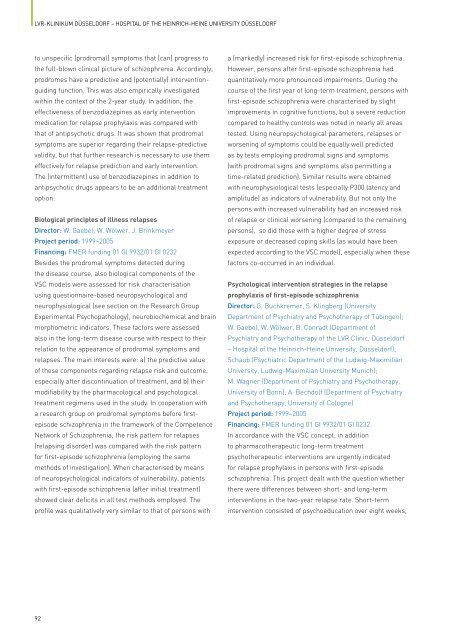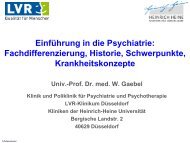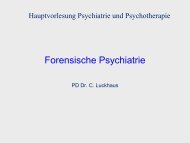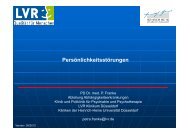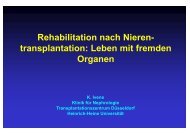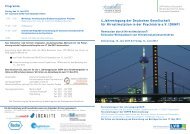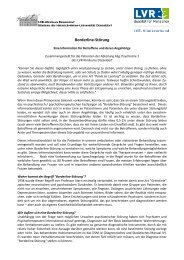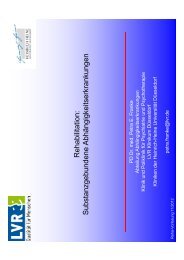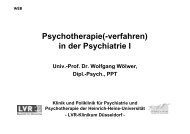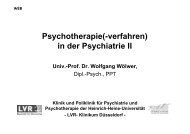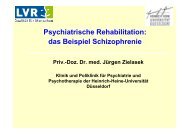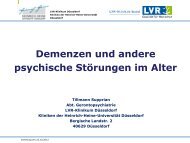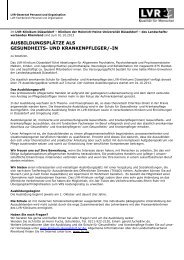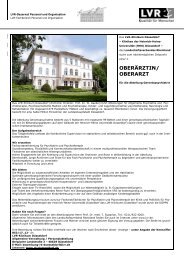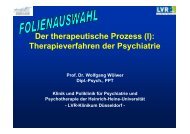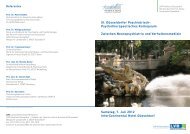LVR-Klinikum Düsseldorf Hospital of the Heinrich-Heine University ...
LVR-Klinikum Düsseldorf Hospital of the Heinrich-Heine University ...
LVR-Klinikum Düsseldorf Hospital of the Heinrich-Heine University ...
You also want an ePaper? Increase the reach of your titles
YUMPU automatically turns print PDFs into web optimized ePapers that Google loves.
<strong>LVR</strong>-KLINIKUM DÜsseLDORF – hOsPITaL OF The heINRIch-heINe UNIVeRsITY DÜsseLDORF<br />
to unspecific (prodromal) symptoms that (can) progress to<br />
<strong>the</strong> full-blown clinical picture <strong>of</strong> schizophrenia. Accordingly,<br />
prodromes have a predictive and (potentially) interventionguiding<br />
function. This was also empirically investigated<br />
within <strong>the</strong> context <strong>of</strong> <strong>the</strong> 2-year study. In addition, <strong>the</strong><br />
effectiveness <strong>of</strong> benzodiazepines as early intervention<br />
medication for relapse prophylaxis was compared with<br />
that <strong>of</strong> antipsychotic drugs. It was shown that prodromal<br />
symptoms are superior regarding <strong>the</strong>ir relapse-predictive<br />
validity, but that fur<strong>the</strong>r research is necessary to use <strong>the</strong>m<br />
effectively for relapse prediction and early intervention.<br />
The (intermittent) use <strong>of</strong> benzodiazepines in addition to<br />
antipsychotic drugs appears to be an additional treatment<br />
option.<br />
Biological principles <strong>of</strong> illness relapses<br />
Director: W. Gaebel, W. Wölwer, J. Brinkmeyer<br />
Project period: 1999–2005<br />
Financing: FMER funding 01 GI 9932/01 GI 0232<br />
Besides <strong>the</strong> prodromal symptoms detected during<br />
<strong>the</strong> disease course, also biological components <strong>of</strong> <strong>the</strong><br />
VSC models were assessed for risk characterisation<br />
using questionnaire-based neuropsychological and<br />
neurophysiological (see section on <strong>the</strong> Research Group<br />
Experimental Psychopathology), neurobiochemical and brain<br />
morphometric indicators. These factors were assessed<br />
also in <strong>the</strong> long-term disease course with respect to <strong>the</strong>ir<br />
relation to <strong>the</strong> appearance <strong>of</strong> prodromal symptoms and<br />
relapses. The main interests were: a) <strong>the</strong> predictive value<br />
<strong>of</strong> <strong>the</strong>se components regarding relapse risk and outcome,<br />
especially after discontinuation <strong>of</strong> treatment, and b) <strong>the</strong>ir<br />
modifiability by <strong>the</strong> pharmacological and psychological<br />
treatment regimens used in <strong>the</strong> study. In cooperation with<br />
a research group on prodromal symptoms before firstepisode<br />
schizophrenia in <strong>the</strong> framework <strong>of</strong> <strong>the</strong> Competence<br />
Network <strong>of</strong> Schizophrenia, <strong>the</strong> risk pattern for relapses<br />
(relapsing disorder) was compared with <strong>the</strong> risk pattern<br />
for first-episode schizophrenia (employing <strong>the</strong> same<br />
methods <strong>of</strong> investigation). When characterised by means<br />
<strong>of</strong> neuropsychological indicators <strong>of</strong> vulnerability, patients<br />
with first-episode schizophrenia (after initial treatment)<br />
showed clear deficits in all test methods employed. The<br />
pr<strong>of</strong>ile was qualitatively very similar to that <strong>of</strong> persons with<br />
92<br />
a (markedly) increased risk for first-episode schizophrenia.<br />
However, persons after first-episode schizophrenia had<br />
quantitatively more pronounced impairments. During <strong>the</strong><br />
course <strong>of</strong> <strong>the</strong> first year <strong>of</strong> long-term treatment, persons with<br />
first-episode schizophrenia were characterised by slight<br />
improvements in cognitive functions, but a severe reduction<br />
compared to healthy controls was noted in nearly all areas<br />
tested. Using neuropsychological parameters, relapses or<br />
worsening <strong>of</strong> symptoms could be equally well predicted<br />
as by tests employing prodromal signs and symptoms<br />
(with prodromal signs and symptoms also permitting a<br />
time-related prediction). Similar results were obtained<br />
with neurophysiological tests (especially P300 latency and<br />
amplitude) as indicators <strong>of</strong> vulnerability. But not only <strong>the</strong><br />
persons with increased vulnerability had an increased risk<br />
<strong>of</strong> relapse or clinical worsening (compared to <strong>the</strong> remaining<br />
persons), so did those with a higher degree <strong>of</strong> stress<br />
exposure or decreased coping skills (as would have been<br />
expected according to <strong>the</strong> VSC model), especially when <strong>the</strong>se<br />
factors co-occurred in an individual.<br />
Psychological intervention strategies in <strong>the</strong> relapse<br />
prophylaxis <strong>of</strong> first-episode schizophrenia<br />
Director: G. Buchkremer, S. Klingberg (<strong>University</strong><br />
Department <strong>of</strong> Psychiatry and Psycho<strong>the</strong>rapy <strong>of</strong> Tübingen);<br />
W. Gaebel, W. Wölwer, B. Conradt (Department <strong>of</strong><br />
Psychiatry and Psycho<strong>the</strong>rapy <strong>of</strong> <strong>the</strong> <strong>LVR</strong> Clinic, <strong>Düsseldorf</strong><br />
– <strong>Hospital</strong> <strong>of</strong> <strong>the</strong> <strong>Heinrich</strong>-<strong>Heine</strong> <strong>University</strong>, <strong>Düsseldorf</strong>);<br />
Schaub (Psychiatric Department <strong>of</strong> <strong>the</strong> Ludwig-Maximilian<br />
<strong>University</strong>, Ludwig-Maximilian <strong>University</strong> Munich);<br />
M. Wagner (Department <strong>of</strong> Psychiatry and Psycho<strong>the</strong>rapy,<br />
<strong>University</strong> <strong>of</strong> Bonn); A. Bechdolf (Department <strong>of</strong> Psychiatry<br />
and Psycho<strong>the</strong>rapy, <strong>University</strong> <strong>of</strong> Cologne)<br />
Project period: 1999–2005<br />
Financing: FMER funding 01 GI 9932/01 GI 0232<br />
In accordance with <strong>the</strong> VSC concept, in addition<br />
to pharmaco<strong>the</strong>rapeutic long-term treatment<br />
psycho<strong>the</strong>rapeutic interventions are urgently indicated<br />
for relapse prophylaxis in persons with first-episode<br />
schizophrenia. This project dealt with <strong>the</strong> question whe<strong>the</strong>r<br />
<strong>the</strong>re were differences between short- and long-term<br />
interventions in <strong>the</strong> two-year relapse rate. Short-term<br />
intervention consisted <strong>of</strong> psychoeducation over eight weeks,


